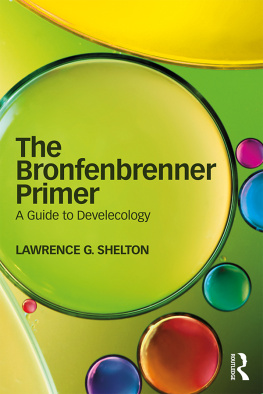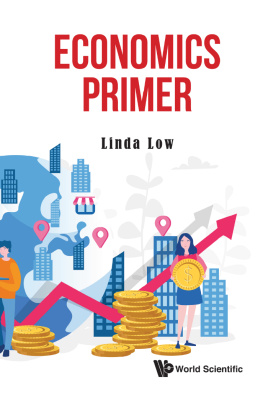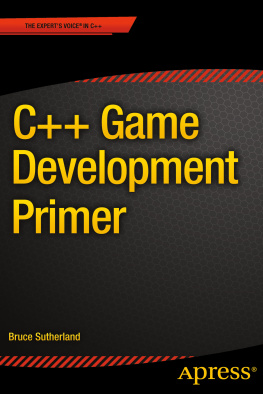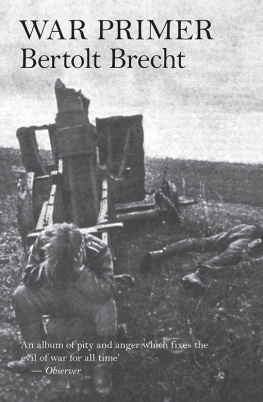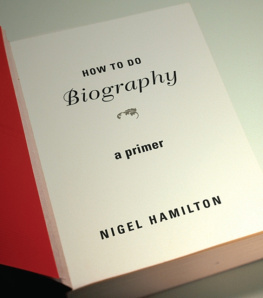Bronfenbrenner Urie - The Bronfenbrenner primer : a guide to develecology
Here you can read online Bronfenbrenner Urie - The Bronfenbrenner primer : a guide to develecology full text of the book (entire story) in english for free. Download pdf and epub, get meaning, cover and reviews about this ebook. year: 2019, publisher: Routledge, genre: Romance novel. Description of the work, (preface) as well as reviews are available. Best literature library LitArk.com created for fans of good reading and offers a wide selection of genres:
Romance novel
Science fiction
Adventure
Detective
Science
History
Home and family
Prose
Art
Politics
Computer
Non-fiction
Religion
Business
Children
Humor
Choose a favorite category and find really read worthwhile books. Enjoy immersion in the world of imagination, feel the emotions of the characters or learn something new for yourself, make an fascinating discovery.
- Book:The Bronfenbrenner primer : a guide to develecology
- Author:
- Publisher:Routledge
- Genre:
- Year:2019
- Rating:5 / 5
- Favourites:Add to favourites
- Your mark:
- 100
- 1
- 2
- 3
- 4
- 5
The Bronfenbrenner primer : a guide to develecology: summary, description and annotation
We offer to read an annotation, description, summary or preface (depends on what the author of the book "The Bronfenbrenner primer : a guide to develecology" wrote himself). If you haven't found the necessary information about the book — write in the comments, we will try to find it.
The Bronfenbrenner primer : a guide to develecology — read online for free the complete book (whole text) full work
Below is the text of the book, divided by pages. System saving the place of the last page read, allows you to conveniently read the book "The Bronfenbrenner primer : a guide to develecology" online for free, without having to search again every time where you left off. Put a bookmark, and you can go to the page where you finished reading at any time.
Font size:
Interval:
Bookmark:

This is the first ever introduction to Urie Bronfenbrenners Ecological Systems Framework written specifically for undergraduate students. The author provides a carefully structured, guided introduction to Bronfenbrenners concepts, their interpretation, and their potential applications. Bronfenbrenners scientific analysis of the role the environment plays in human development earned him a premier place alongside Jean Piaget, Sigmund Freud, and Erik Erikson as a contributor to our understanding of developmental processes. His ideas are essential for analyzing how development happens, how it goes astray, how to right it when it does, and how to create environments that will promote healthy development.
The Bronfenbrenner Primer walks students through each component of the framework in a logical order, helping students build a solid, systematic understanding. It describes the background and context that led Bronfenbrenner to develop his framework, illustrates a wide array of potential applications, and provides activities students can do to practice applying the framework to their own experience. Honed over 25 years of teaching Bronfenbrenners ideas, this text will be essential reading for students across the behavioral and social sciences.
Lawrence G. Shelton is a Developmental Psychologist who has taught in the Human Development and Family Studies Program at the University of Vermont since 1971. He has taught and applied Bronfenbrenners ideas in novel ways for the past 25 years in a wide-ranging teaching and consulting career. Shelton has elaborated on and expanded Bronfenbrenners ideas to emphasize the necessity of integrating ecological and developmental perspectives, an approach he refers to as Develecology.
A Guide to Develecology
Lawrence G. Shelton

First published 2019
by Routledge
711 Third Avenue, New York, NY 10017
and by Routledge
2 Park Square, Milton Park, Abingdon, Oxon, OX14 4RN
Routledge is an imprint of the Taylor & Francis Group, an informa business
2019 Taylor & Francis
The right of Lawrence G. Shelton to be identified as author of this work has been asserted by him in accordance with sections 77 and 78 of the Copyright, Designs and Patents Act 1988.
All rights reserved. No part of this book may be reprinted or reproduced or utilized in any form or by any electronic, mechanical, or other means, now known or hereafter invented, including photocopying and recording, or in any information storage or retrieval system, without permission in writing from the publishers.
Trademark notice: Product or corporate names may be trademarks or registered trademarks, and are used only for identification and explanation without intent to infringe.
Library of Congress Cataloging-in-Publication Data
Names: Shelton, Lawrence G., author.
Title: The Bronfenbrenner primer : a guide to develecology / Lawrence G. Shelton.
Description: New York, NY : Routledge, 2018. | Includes bibliographical references and index.
Identifiers: LCCN 2018006571| ISBN 9781138037151 (hbk : alk. paper) | ISBN 9781138037168 (pbk : alk. paper) | ISBN 9781315136066 (ebk) Subjects: LCSH: Bronfenbrenner, Urie, 1917-2005. | Developmental psychology. | Environmental psychology. | Social ecology.
Classification: LCC BF713 .S5147 2018 | DDC 155dc23
LC record available at https://lccn.loc.gov/2018006571
ISBN: 978-1-138-03715-1 (hbk)
ISBN: 978-1-138-03716-8 (pbk)
ISBN: 978-1-315-13606-6 (ebk)
Typeset in Bembo
by Wearset Ltd, Boldon, Tyne and Wear
I respectfully dedicate this work to
Urie Bronfenbrenner (19172005)
Armin Grams (19242002)
and all of their generation on whose work we build
A primer is a book presenting the basic elements of a subject, intended for beginning students. The Bronfenbrenner Primer is intended to help you understand one of the core topics in the study of human developmentthe framework of Urie Bronfenbrenners Ecological Systems Model of Development. I wrote this guide for my students at the University of Vermont. Now I am pleased to provide it to a wider audience. It is particularly gratifying for me to have it appear in 2018, the 101st anniversary of Urie Bronfenbrenners birth.
This book is not an attempt to present and explain Bronfenbrenners extensive body of work, or the development of his thinking across his career. It is neither a critique of his model nor a comparison of his thinking to other theories of development. I will not assess the current state of research using his framework. I intend only to provide an introductory guide to understanding the ecological framework for development proposed by Urie Bronfenbrenner, as published in his 1979 book, The Ecology of Human Development. In his book, Bronfenbrenner presented a scientific analysis of the role the environment plays in human development. That book and his subsequent writing on the topic earned Bronfenbrenner a premier place as a contributor to our understanding of human development. His work is cited in every developmental textbook, along with the views of Sigmund Freud, Erik Erikson, Jean Piaget, and others who shape our conceptions of development.
I teach to help students construct an understanding of how people develop. Why does development occur, and how? What influences the course of development? If you want to facilitate development, how can you do that? Over the course of my career, I have studied the works of Freud, Erikson, Sullivan, Piaget, and many other researchers and theorists who consider the processes of development. Each is useful to some degree for understanding some aspects of development. While all of these and many other approaches assume that the environment is a significant determinant of the course or content of development, it is a challenge to find serious consideration of how context shapes development. What are the processes involved? What characteristics of the environment are important in development? How do we compare environments to understand how they lead to differences in development?
As a practitioner, an applied developmental psychologist, who tries to address barriers to development and to promote development, I need to understand not only how people develop, but how the environment shapes development. I need to know what changes in the environment will support development. I have to try to use both a developmental perspective and an ecological perspective to grasp how development has been shaped by the environment and what changes in the environment might shape development in desirable directions.
Bronfenbrenner provides a conceptual framework for understanding the environment half of the processes of development. His framework has been essential to my understanding and my work for many years. The classic and current theorists and researchers of development form one strong core of our understanding, but it was incomplete until Bronfenbrenners work provided a way to conceptualize the environments in which development must occur. This second core is necessary to provide the dual perspective needed to analyze how development happens, how it goes astray, how to right it, and how to create environments that will promote healthy development. Fundamentally, development is the process of transacting with and adapting to the environment we experience as we change biologically.
Font size:
Interval:
Bookmark:
Similar books «The Bronfenbrenner primer : a guide to develecology»
Look at similar books to The Bronfenbrenner primer : a guide to develecology. We have selected literature similar in name and meaning in the hope of providing readers with more options to find new, interesting, not yet read works.
Discussion, reviews of the book The Bronfenbrenner primer : a guide to develecology and just readers' own opinions. Leave your comments, write what you think about the work, its meaning or the main characters. Specify what exactly you liked and what you didn't like, and why you think so.

